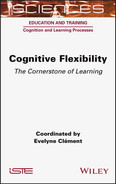Cognitive flexibility is the cornerstone of learning and enables us to cope with a constantly changing environment. By adapting our knowledge and habits in order to respond to new situations, cognitive flexibility plays a fundamental role in learning.
This book proposes a study of the fundamental notions of cognitive flexibility: its measurement and development, its links with metacognition and critical thinking and the role of context in its expression, as well as its involvement in discovering solutions, transferring knowledge and processing analogies.
Convergent perspectives are also presented in order to paint a clear picture of cognitive flexibility and to discuss the issues at stake. Thanks to the combined views of specialists in cognitive and developmental psychology, Cognitive Flexibility suggests new educational possibilities based on the results of empirical work on the subject.
Table of Contents
- Cover
- Title Page
- Copyright
- Introduction
- 1 Measures of Flexibility
- 2 Development of Cognitive Flexibility
- 3 Metacognition and Flexibility: What are the Theoretical Links and What Links have been Observed?
- 4 Critical Thinking and Flexibility
- 5 Successful Solution Discovery and Cognitive Flexibility
- 6 Transfer of Learning and Flexibility in Childhood
- 7 Cognitive Flexibility and Analogy
- 8 Context, Content Effects and Flexibility
- List of Authors
- Index
- End User License Agreement
